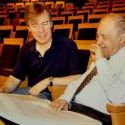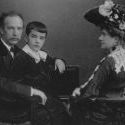-
03
-
03
-
03
-
03
-
03
-
03
-
03
-
03
-
03
-
03
-
03
-
03
-
03
-
03
-
03
-
03
-
03
-
-
-
03
-
03
-
03
-
03
-
03
-
03
-
03
-
03
-
-
03
-
03
-
03
-
03
-
03
-
-
03
-
03
-
03
-
03
-
-
03
Deep Focus: Enriching the Aspen Experience
An array of micro-essays by accomplished musicologists, curated to enhance and enrich your historical and aesthetic engagement with the musical programming offered at Aspen’s summer seasons.
Between the Sacred and the Symphonic: Mendelssohn’s Reformation Symphony

Peter Mercer-Taylor, an expert on Mendelssohn and religious music, discusses the Reformation Symphony’s origins in the commemoration of the Lutheran Reformation and explores its greater innovation, the reclamation of J. S. Bach for the symphonic tradition.
(continue reading)Coming Into Being

In honor of Pierre Boulez’s 100th anniversary in 2025, Maestro David Robertson reflects on his working relationship with the composer, focusing particularly on the repertoire he will perform with the Aspen Contemporary Ensemble on July 9.
(continue reading)Aspen & American Music

In the final entry of the 2024 Deep Focus series, Assistant Program Book Editor Christine Marie Goss takes a whirlwind tour through the history of the Aspen Music Festival, with special attention to its place in American composition, its sterling contribution to performance at the highest level, and its potential to bring inclusive change to the world of classical music.
(continue reading)Intimate Portraits: Richard Strauss’s Family Life Through Music

The relationship between Richard Strauss and Pauline Strauss (née de Ahna) was heightened by emotional turbulence and strong-headed personalities on both sides. Surveying a few of the Aspen Festival’s 2024 performances of Strauss’s music, Dr. Patricia Prokert paints a rich portrait of a marriage through descriptions of lieder (songs) and the dramatic tone poem Ein Heldenleben.
(continue reading)Children’s Music at The Aspen Music Festival

"Children’s Music at The Aspen Music Festival” by Kate Hamori addresses the enduring and varied roles that childhood plays in classical music. Children—as performers, intended audiences, and direct sources of creative inspiration for adult-composers—inadvertently exert tangible influence over the classical canon as we know it. Furthermore, many adult composers, at one point or another, write works based on their own childhood memories, either to simply reminisce or as a means by which to cope with their adulthood struggles. While it is easy to think of children and childhood as afterthoughts in the arts, Hamori demonstrates how children play a significant role in shaping musical culture, and that childhood is an inescapable part of classical music's legacy.
(continue reading)-
03
-
03
-
03
-
03
-
03
-
03
-
03
-
03
-
03
-
03
-
03
-
03
-
03
-
03
-
03
-
03
-
03
-
-
-
03
-
03
-
03
-
03
-
03
-
03
-
03
-
03
-
-
03
-
03
-
03
-
03
-
03
-
-
03
-
03
-
03
-
03
-
-
03